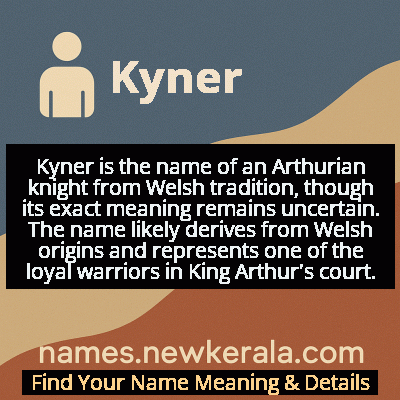Kyner Name Meaning & Details
Origin, Popularity, Numerology Analysis & Name Meaning of Kyner
Discover the origin, meaning, and cultural significance of the name KYNER. Delve into its historical roots and explore the lasting impact it has had on communities and traditions.
Name
Kyner
Gender
Male
Origin
Arthurian
Lucky Number
1
Meaning of the Name - Kyner
Kyner is the name of an Arthurian knight from Welsh tradition, though its exact meaning remains uncertain. The name likely derives from Welsh origins and represents one of the loyal warriors in King Arthur's court.
Kyner - Complete Numerology Analysis
Your Numerology Number
Based on Pythagorean Numerology System
Ruling Planet
Sun
Positive Nature
Leaders, ambitious, highly driven, self-reliant, innovative.
Negative Traits
Overly aggressive, domineering, impatient, selfish.
Lucky Colours
Red, orange, gold.
Lucky Days
Sunday.
Lucky Stones
Ruby, garnet.
Harmony Numbers
2, 3, 9.
Best Suited Professions
Entrepreneurs, managers, engineers.
What People Like About You
Courage, determination, leadership.
Famous People Named Kyner
Sir Kyner
Arthurian Knight
One of King Arthur's loyal knights mentioned in medieval Welsh texts and Arthurian romances
Kyner ap Cynfarch
Welsh Noble
Historical figure from Welsh genealogy who may have inspired the Arthurian character
Cynyr Farfog
Legendary Figure
Welsh chieftain and father of Saint Non, sometimes identified with the Arthurian Kyner
Name Variations & International Equivalents
Click on blue names to explore their detailed meanings. Gray names with will be available soon.
Cultural & Historical Significance
The cultural significance of Kyner extends beyond his individual character to represent the collective of lesser-known Arthurian knights who formed the foundation of Camelot's military strength. While figures like Lancelot and Gawain dominate popular Arthurian consciousness, Kyner symbolizes the reliable, loyal knights who supported Arthur's reign without seeking personal glory. This reflects broader cultural values about community, loyalty, and the importance of supporting roles in achieving great collective goals. The persistence of his name in Arthurian tradition demonstrates how Celtic cultural elements were preserved and adapted within the larger Arthurian mythos.
Extended Personality Analysis
The name Kyner evokes personality traits centered around steadfast loyalty, quiet competence, and traditional values. Individuals with this name are often perceived as reliable and grounded, possessing an inner strength that doesn't require external validation. They tend to be the type who work diligently behind the scenes, ensuring stability and continuity rather than seeking recognition. This reflects the Arthurian knight's role as a foundational supporter of larger causes rather than a spotlight-seeking hero.
Kyner suggests a personality that balances practical wisdom with emotional resilience. These individuals typically exhibit strong problem-solving abilities and strategic thinking, approaching challenges with measured consideration rather than impulsive action. They value deep, lasting relationships over superficial connections and demonstrate consistent loyalty to those they care about. The name carries connotations of Celtic stoicism combined with chivalric honor, creating a personality profile of someone who embodies traditional virtues while adapting to modern circumstances with grace and intelligence.
Modern Usage & Popularity
In contemporary naming practices, Kyner remains exceptionally rare and is primarily used by parents with specific interests in Arthurian legend, Welsh heritage, or seeking unique historical names. The name has never appeared in popular baby name rankings and maintains a niche appeal among enthusiasts of medieval literature and Celtic history. Its usage is most common in Wales and among diaspora communities seeking to preserve cultural connections, though it occasionally appears in other English-speaking countries as a distinctive alternative to more common Arthurian names like Arthur or Lancelot. The name's rarity ensures it stands out while its historical and literary associations provide depth and cultural significance that appeal to parents wanting a name with substance beyond current trends.
Symbolic & Spiritual Meanings
Symbolically, Kyner represents the essential but often overlooked foundations upon which great achievements are built. The name carries metaphorical meanings of loyalty, tradition, and quiet strength—qualities that enable rather than dominate. It symbolizes the connection between historical reality and mythological imagination, embodying how actual historical figures become transformed into legendary characters through cultural storytelling. Kyner also represents Celtic cultural persistence, demonstrating how Welsh traditions were incorporated and preserved within the larger Arthurian mythos that eventually spread throughout European literature.
Metaphorically, Kyner signifies the importance of supporting roles in any great endeavor—the reliable individuals who form the backbone of organizations, families, and communities without seeking personal acclaim. The name suggests that true strength often lies in consistency and commitment rather than dramatic heroism. It also represents cultural adaptation and survival, showing how names and stories evolve while maintaining connections to their origins. In a broader sense, Kyner symbolizes the transmission of cultural memory and the way local histories become part of universal legends.

